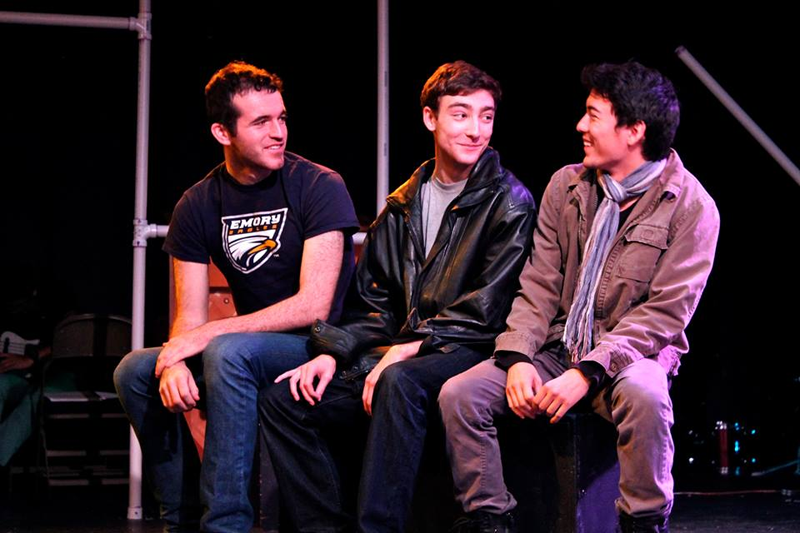“Seasons of Love” have come to Emory, with Ad Hoc Productions’ rendition of “Rent,” Jonathan Larson’s legendary rock musical about love, loss and “living with, living with, not dying from disease.” Directed by Oxford College sophomore Tyler Moon and College junior Chelsea Walton, the show features moving lead performances and an invigorating ensemble cast.
“Rent” is performed on a simple set outfitted with Christmas lights, and the actors are accompanied by a talented group of live musicians. The play opens with a focus on observant filmmaker Mark, portrayed with a sense of knowing and understanding by College junior Billy Tisano. Mark’s roommate, depressed ex-rocker Roger (played by College sophomore Ryan Stevenson), is searching for the perfect song and mourning the death of his ex-girlfriend. Stevenson brings real grit to the role, hiding in his apartment and remaining unmoved by anyone until he meets Mimi (College freshman Cloe Gentile).
Gentile has a wonderful singing voice, and as Mimi she dances into Roger’s life with great energy. Gentile and Stevenson have strong chemistry, and Gentile captures the audience’s attention with Mimi’s sensual song “Out Tonight.” Mimi wildly dances for the audience and for Roger, but she cannot seem to break Roger’s sad resolve. Even when he accepts Mimi’s love, Roger fights with his inner demons in the song “I Should Tell You.”
In the midst of Roger’s struggle to open up, Collins, an out-of-work academic, and Angel, a kind drag queen, provide some romantic relief. With their storyline, these two characters explore how to preserve joy and love in spite of pain and disease. The result is a very sweet, caring relationship nicely portrayed by College freshmen Aaron Freedman (Collins) and Mathew Sperling (Angel). Freedman has a soulful voice and expresses Collins’ cheerful countenance with an ever-present smile. Sperling sports Angel’s outrageous costumes boldly, but brings a gentle spirit to the character. He teaches Collins, Roger, Mark and Mimi how to love without inhibition.
The first act builds up to a protest organized by Maureen, Mark’s ex-girlfriend and lawyer Joanne’s current squeeze. Maureen, portrayed by College senior Kristie Denlinger, completely steals the show with her animated and hilarious protest speech. At one point in the speech, Denlinger implores audience members to moo with her, and we gleefully obliged.
Denlinger precisely depicts Maureen’s radical activist hippie spirit and invigorates the show.
Maureen and the company are supported by the very put-together Joanne (College junior Chelsae-Daughn Gill-James) and her no-nonsense attitude. Gill-James shows off her superb singing chops with Maureen and Joanne’s break-up song “Take Me for What I Am.”
Maureen and Joanne enliven the rest of the cast just in time for “La Vie Boheme.” This song encapsulates the free spirit of “Rent,” and the company joyfully dances on tables, thrusts, twirls and sings their hearts out. Larger numbers like “La Vie Boheme” and “Seasons of Love” give the spectacular members of the ensemble a chance to show off their excellent voices and hilarious theatrical timing.
As the show moves into the second act, the play takes a turn for the serious. Angel’s health declines and everyone is deeply affected. Tensions flare and a slur is directed at Collins, but his friends quickly come to his defense.
“Rent” shows how fear can damage people and their relationships more than disease, but each heartfelt song and tender scene prove that love and honesty provide healing.
Overall, Ad Hoc’s “Rent” is a lovely show, genuinely and passionately performed by a great cast and an excellent ensemble. From the twinkling lights to the powerful songs, “Rent” brings the holiday spirit to Emory and reminds us all to “remember the love.”
– By Jordie Davies
Photo by Krysten Johnson
The Emory Wheel was founded in 1919 and is currently the only independent, student-run newspaper of Emory University. The Wheel publishes weekly on Wednesdays during the academic year, except during University holidays and scheduled publication intermissions.
The Wheel is financially and editorially independent from the University. All of its content is generated by the Wheel’s more than 100 student staff members and contributing writers, and its printing costs are covered by profits from self-generated advertising sales.







This is a dreadful review full of fluff, signifying nothing. This production features its strongest actors and singers in bit parts. With the exception of Mimi and Maureen, the main cast falls painfully flat. The weakest theater production of the semester should not be called “lovely,” and this article should have focused on critiquing rather than plot summary.
This truly is terribly written review. Rent – based on the Puccini opera La Boheme – is ultimately a story about AIDS and its impact on the LGBTA community… yet, reading this review, you would never know that. If I didn’t know any better, the reviewer either did not watch the show or did not understand it, To not see anywhere in the review the mention of gay, lesbian, transgender or AIDS suggests the reviewer did not have a clue what this show was about.
Angel is NOT a drag queen. Angel is transgender. There is a significant difference.
And most certainly, one would hardly suggest that Rent is the type of show that would put anyone in the holiday spirit. Three of the main characters have AIDS and one dies from AIDS. It is deeply tragic but teaches us to live each day as though it were our last and to cherish the relationships we have.
The reason AIDS was probably not mentioned in the review is because it’s supposed to be a surprise. Every character, aside from Joanne, Mark, and Maureen, end up talking about their AIDS at different points. You don’t even realize Mimi had AIDS until the end of the first act.
And I think the reviewer didn’t offer critique because we don’t go to a performing arts school. The talent that was presented was pretty good considering most students who preform in student theater at Emory are just doing it for fun. So did we really expect it to be flawless?
Overall the cast presented their characters well, even the ensemble (especially during I’ll Cover You (Reprise), and Will I) the only issue is that they weren’t the best singers (aside from the parents, Mimi and Joanne). Congratulations RENT cast, don’t let a couple negative comments get you down, you guys were incredible and as a person who LOVES RENT, I can say that you guys were pretty fantastic and I was not disappointed.
My critique was not of the performance or the acting or the singing… it was of the reviewer’s inability to convey that the story was about AIDS and its impact. The oversight in mentioning that in the review was inexcusable. Its like telling a story about Obama and forgetting to mention he got elected President. AIDS is the most obvious thing about the show. Using the word “disease” instead of AIDS smacks of editorial censorship or outright ignorance. You pick.
Yeah, how’s this a review if it doesn’t actually offer any critiques?
I saw the show and it wasn’t perfect, there were definitely some glaring flaws and weird choices of cast and presentation (like contact). But unlike A Theater Person I thought the cast was good overall.
Shout out to the music director Daniel!
Hollywood star Will Smith is reportedly not returning to the sequel of his hit sci-fi film ‘Independence Day’. It is rumoured that the 45-year-old actor will not be reprising his role as Captain Steven Hiller in the sequel that has been titled ‘ID Forever
Womens Comfort Shoes http://clothingonline.us/womens-shoes-womens-comfort-shoes-c-356_362.html
“The Walking Dead” left us hanging with its midseason finale last year, so we knew to expect surprises when the AMC show returned Sunday
Vivienne Westwood http://shoesclothingonline.com/vivienne-westwood_categories252/
The quote is from “La Vie Boheme” not seasons of love. And they don’t do anything a justice and mess up so many facts… Angel a drag queen?!? It honestly is just angering me….